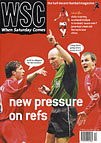 How is the League of Wales losing out on television coverage to Welsh rugby? Paul Ashley-Jones finds out
How is the League of Wales losing out on television coverage to Welsh rugby? Paul Ashley-Jones finds out
If you were to believe all you hear, there is far too much football on TV. Even the most dedicated of fans is in danger of overexposure, apparently. But not in Wales. Yes, we get ITV’s Premiership and Champions League coverage and, if you’re prepared to subscribe, you can access the football overload weighing down most of the rest of the country.
But what I’m talking about is Welsh football: three teams in the lower reaches of the Nationwide League and a national side of Ryan Giggs plus ten others. There is also the League of Wales.
If you know anything about the League of Wales it will probably be the heavy defeats in Europe and the fact that you’ll find the results in your Sunday paper somewhere under those of the Screwfix League (South). The country’s national league gets little more coverage in Wales than in the rest of the country. After all, in Wales we have rugby union, for which we are all so grateful.
Not factually correct of course, but this is roughly how they think in the BBC Wales Sports department. This is the organisation that holds the TV rights to the LoW, the national side and Welsh Cup. Prior to this season our football coverage had been restricted to live internationals, Gol! – a weekly 45-minute highlights programme produced by the BBC for S4C (the Welsh Channel 4) – and something called the FAW Premier Cup.
The latter competition, devised and funded by BBC Wales, brought together the top LoW clubs with the three Nationwide clubs and the top finishing Welsh club in the non-League pyramid. The main incentive for clubs to enter was to compete for a share of the total prize money of £750,000 a year. Not a lot, but with TV highlights and the occasional live match, it was a significant source of income and publicity for the LoW clubs in particular.
Now all this has changed. This season Gol! has been axed and the Premier Cup “restructured” (less coverage and a 50 per cent cut in money). The reason is that BBC Wales have paid out £22.5 million in a five-year deal with the Welsh Rugby Union. This represents a pretty major part of the sports budget and savings have had to be made elsewhere. The deal was triumphantly proclaimed with a series of adverts stating that “Rugby’s coming home to BBC Wales”. The fact that no one else bid for it (previous holders ITV decided not to bother) is never mentioned.
At the same time it was announced that the former rugby international Nigel Walker was to be the new head of sport at BBC Wales, though he has no obvious qualifications for the job apart from his playing background. He replaces a Welsh rugby international, whose predecessor was also… a Welsh rugby international. It all leaves LoW coverage at a couple of minutes on a Saturday evening and the Welsh Cup with none at all. This compares to up to three live rugby games and an extended highlights package each week.
For those brought up in Wales this bias will come as no surprise. This time however, there are signs that football is fighting back. The local press and the BBC Wales sports department have been inundated with letters of complaint. Despite its critics, the generally poor European perform- ances and the lack of sponsorship, the LoW has seen a gradual improvement in quality and attendances since its inception ten years ago.
The FAW have also got something right with the decision to play all Wales internationals at the Millennium Stadium and to keep ticket prices low. When Mark Hughes’s team had a theoretical chance of World Cup qualification, attendances were regularly in excess of 50,000. Playing the FA and Worthington Cup finals in Wales has also raised the profile of the game here.
People are finally beginning to question the assertion that rugby is the prominent sport in Wales and must therefore be treated as such. A Welsh daily newspaper recently pointed out that while the FAW has 2,326 member clubs, the WRU has only 222 and that 48 per cent of primary age schoolboys played with a football team, compared with 25 per cent who played rugby. But you wouldn’t think it from watching the TV.
From WSC 178 December 2001. What was happening this month